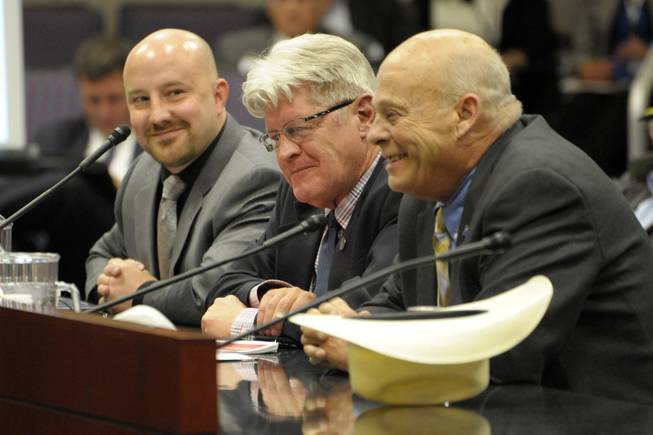
AP Photo/Lisa J. Tolda
Nevada’s Assistant State Controller Geoffrey Lawrence, left, State Controller Ron Knecht and Assemblyman Jim Wheeler, R-Minden, present an alternative tax plan to Gov. Brian Sandoval’s plan during a budget hearing Thursday, May 14, 2015, inside the Nevada Legislative Building in Carson City.
Published Thursday, May 14, 2015 | 5:38 p.m.
Updated Thursday, May 14, 2015 | 6:47 p.m.
CARSON CITY — Gov. Brian Sandoval released an updated tax proposal Thursday that he said improves upon a plan he introduced earlier in the session and incorporates ideas from leaders in the Assembly, which has the next move on taxes as the legislative session enters its final weeks.
Sandoval unveiled the "Nevada Revenue Plan," which combines elements of the bill he presented in March, SB252, and parts of a plan from Assembly Republican leaders Paul Anderson and Derek Armstrong, AB464.
It's expected to have a better chance of garnering the required two-thirds majority in the Assembly than his original bill.
"It's good policy. It's improved. It's strong," Sandoval said. "It recognizes what the Assembly and senators talked about and it follows up on what I said in the State of the State, which is 'we will listen.'"
Sandoval is seeking to extend or raise $1.1 billion in taxes over the next two years to fund his $7.4 billion budget plan. He's proposed hundreds of millions more dollars for education programs for English language learners, students in poverty, children with disabilities and gifted and talented students.
The three-part plan raises the business license fee from $200 to a flat $500 for corporations and $300 for other business entities. It raises the rate of the existing modified business tax on payroll from 1.17 percent to 1.48 percent, similar to a proposal from Armstrong and Anderson.
Finally, it implements a "commerce tax," which is similar to the governor's original business license fee and is based on a business' gross revenue and industry type. It applies to businesses that make more than $3.5 million in Nevada revenue over a year.
Sandoval's tax bill passed the Senate in a 17-4 vote but faced major obstacles in the less-predictable and less-cohesive Assembly. Critics said they worried Sandoval's plan would hurt small businesses, and Assembly leadership wanted to take a different route to raise the money.
Armstrong, who chairs the Assembly Taxation Committee, said it was unlikely that the governor's initial plan would make it through the Republican-dominated Assembly.
"I think everyone kind of recognized it wasn't going anywhere," he said.
Any plan increasing taxes could be derailed if a group of conservative Republicans gains enough momentum, especially with the constitutionally required two-thirds majority vote needed for any tax increase.
Nearly a dozen Assembly Republicans backed a long-shot alternative plan that doesn't raise or continue expiring taxes. The alternative, which was discussed in a three-hour hearing on Thursday, projects to raise $6.9 billion in revenue through department cuts and by requiring local government workers to pay more into their pensions.
Republican Controller Ron Knecht, who helped create the alternative budget, said it reflected a core Republican belief — that the state needed to reign in government spending.
"Our conclusion is the state of Nevada has a spending problem, not a revenue problem," he said.
Lawmakers have 19 days left in the regular, 120-day legislative session to resolve their budget differences and decide whether to back a tax plan. Anderson, who chairs the Assembly budget committee, said the plan will likely get a hearing on Tuesday.
Republican Senate Majority Leader Michael Roberson said he's optimistic a tax plan will get enough votes.
"I'm optimistic that each house and each party — all of us — are working together to come up with a viable solution for our revenue needs," he said. "I think we're moving in the right direction."

Join the Discussion:
Check this out for a full explanation of our conversion to the LiveFyre commenting system and instructions on how to sign up for an account.
Full comments policy